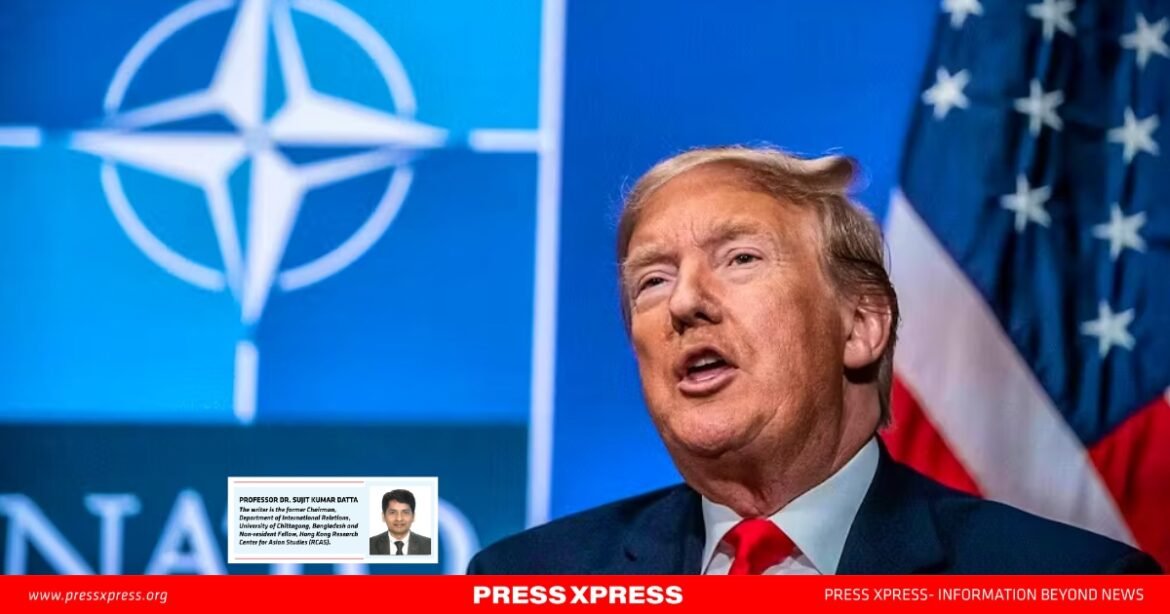The newly elected United States President Donald Trump has once more thrust NATO into the spotlight by forcefully calling for significant alterations to its funding structure. Trump’s suggestion to heighten the defense outlay requisite for NATO members from 2 percent of their national product to 5 percent has triggered considerable discussion and apprehension among the alliance’s 32 member states. This suggestion emerges against the backdrop of exacerbated security challenges following the Russia-Ukraine war, which has amplified the fiscal demands on NATO.
NATO, established in 1949, has long acted as the cornerstone of Western military cooperation, aimed at confirming collective defence and maintaining peace in the North Atlantic area. Conventionally, NATO’s funding structure has necessitated member countries to contribute no less than 2 per cent of their GDP to defence expenditure. However, this target has been a contention, with numerous member states failing to meet the agreed-upon threshold.
During Trump’s previous tenure, he was vocal about the disproportionate financial burden borne by the United States. Trump’s rhetoric often centred on demanding fairer financial contributions from European allies, who, in his view, relied excessively on U.S. military backing. His push for a 5 per cent contribution mirrors a prolongation and intensification of this stance, emphasizing the necessity for NATO members to take greater accountability for their defence.
Some view Trump’s recommendation to increase defence spending to 5 per cent of GDP as a necessary manoeuvre to reinforce NATO’s abilities amid evolving worldwide dangers. The ongoing Russia-Ukraine conflict has illuminated the necessity for a robust and well-resourced military alliance to counter potential aggressors. The amplified fiscal commitments could improve NATO’s readiness, modernize military infrastructure, and ensure technological progressions in defence capabilities.
However, this proposed expansion poses significant challenges. Numerous NATO members, particularly smaller and economically weaker countries, may struggle to meet this elevated spending target. Allocating 5 per cent of GDP to defence could necessitate cuts in other critical areas, for example, healthcare, education, and social services, potentially resulting in homegrown discontent. Moreover, the financial aftermath of the COVID-19 pandemic has left many countries with strained budgets, making it difficult to justify such a substantial increase in defence expenditure.
Trump is not the sole proponent of higher defence spending within NATO. NATO Secretary-General Mark Rutte has also called for amplified contributions, highlighting the growing security threats and the necessity for a more resilient alliance. Rutte’s alignment with Trump’s viewpoint indicates a shared worry about NATO’s future strength and sustainability. However, the push for higher spending is met with blended reactions among member states. Increased defence expenditure is more likely supported by certain countries, such as Poland and the Baltic states, that perceive Russian aggression as an imminent threat. In contrast, other members, particularly in Western Europe, may be more hesitant, fearing the domestic political backlash and economic strain that such actions could entail.
The proposed effects of Trump’s suggestions on geopolitics add intricacy to discussions on foreign policy. His claim underscores confidence in strong leadership and direct negotiations with opponents, which he argues may have prevented the ongoing conflict.
While speculative, it represents Trump’s broader strategy of assertive participation internationally. The recommendation to boost NATO expenditures will undoubtedly carry significant ramifications globally. It could demonstrate to rivals such as Russia and China the alliance’s reinforcement of commitment and arsenal. Still, it risks exacerbating tensions, potentially triggering an expensive and destabilizing arms race in volatile regions.
Balancing fair contributions and collective protection presents perpetual difficulties for NATO. The organization’s potency stems from unity and shared vows of mutual defence among members. While appropriate fiscal participation is important, overzealous demands risk fracturing accords or alienating key states. If actualized, Trump’s plan could prompt re-evaluations of NATO’s strategic priorities and resource distribution. It may also cause rethinking of relationships with non-European partners and emerging dangers such as digital threats and terrorism. Rather than abrupt 5 per cent demands, NATO could consider a phased financial increase, allowing nations to reallocate budgets step-by-step and circumvent economic disruptions domestically.
To allay concerns about funds being used effectively, NATO should bolster mechanisms, ensuring transparency and shared responsibility for tangible improvements to defence capabilities that match higher contributions. NATO must explore alternative but synergistic strategies beyond traditional military spending, incorporating sizeable investments in cyber protection, information sharing across borders, and diplomatic outreach to tackle intricate threats. Upholding the political cohesion of the alliance is paramount. NATO needs continuous, solution-oriented discussions with each member to ensure higher costs do not undermine our unison commitment to mutual protection.
The future course of NATO under President Trump’s leadership arrives at a pivotal crossroads. The proposed rise in defence expenditures underscores the need for a robust and capable alliance against evolving global dangers.
However, it also presents challenges requiring prudent navigation to guarantee the sustainability and unity of NATO. As the alliance considers the next steps, it must balance financial burden-sharing with the overarching goal of collective security. By adopting a thoughtful, inclusive approach, NATO can reinforce its position as a cornerstone of worldwide peace and stability, adapting to new tests while preserving the solidarity defining its legacy.


